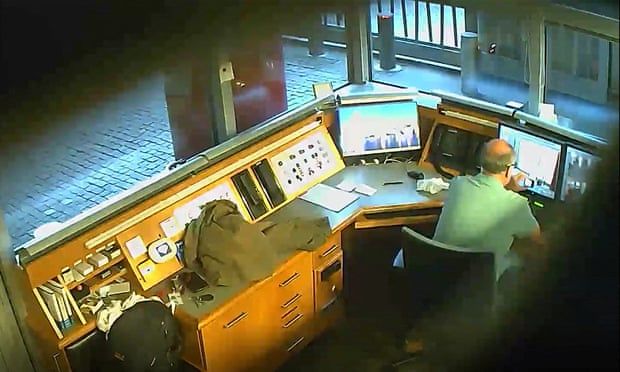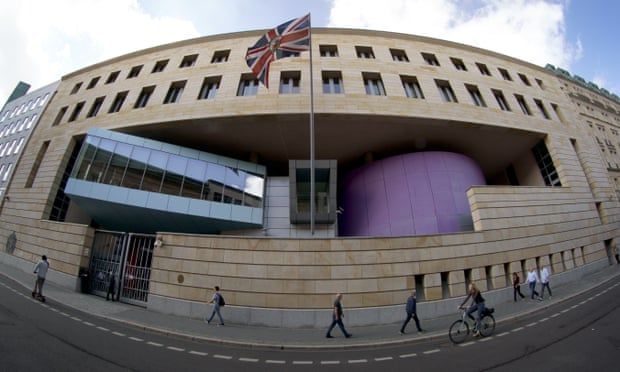
Depression and drinking no excuse for ‘treachery’, UK embassy spy told
A British embassy security guard caught spying for Russia has been told by a judge that his depression and drinking were no excuse for the “treachery” to his country.
David Ballantyne Smith, 58, originally from Paisley in Scotland, gathered secret documents and passed them on to Russian authorities while working as a security guard at the embassy in Berlin. He was caught after an undercover operation in 2021 and has admitted to eight charges under the Official Secrets Act.
The judge said Smith was a “wholly unreliable” witness who gave “incredible, misleading and implausible” answers as he sought to downplay his activity.
Making his ruling after three days of hearings at the Old Bailey, Mr Justice Wall told the court he intended to sentence Smith on Friday on the basis he had an “ongoing relationship with someone at the Russian embassy and was paid for his treachery”.
A former aircraftman with the RAF, Smith was “motivated by his antipathy towards this country and intended to damage this country’s interests by acting as he did”, the judge said.
Smith had claimed he was lonely, depressed and drinking up to seven pints a day when he began leaking secrets from the embassy in an attempt to cause it embarrassment.
The judge accepted Smith “might have been somewhat depressed and lonely” after his Ukrainian wife went back to her home country and “coped with this by drinking more than was good for him”.
 A still from CCTV footage shows Smith in the security kiosk of the British embassy in Berlin.
A still from CCTV footage shows Smith in the security kiosk of the British embassy in Berlin.“I am sure that it was done either under direction or at a time when the defendant had a relationship with someone from the Russian embassy and was done carefully in order to further that relationship,” the judge said.
Smith pleaded guilty to eight charges but claimed he did not intentionally cause any harm.
However, the judge described him as a witness who was “wholly unreliable” and was “deliberately downplaying his intentions in an effort to make his offending seem less serious than in fact it was”.
He did not find Smith to be a “witness of truth” as he gave some answers that were incredible and said things at other times that were “mutually inconsistent” as he sought to mislead the court with implausible answers.
Smith was aware of the danger of leaking personal details of employees at the embassy, but “decided to do it anyway”.
There was clear evidence of Smith having a contact and intending to use that channel of communication to provide Russia with more information that might have been of assistance to them, the judge said.
He rejected the idea that Smith made videos and collected documents “in drink, on the spur of the moment” or that he acted “in a befuddled way because of his poor mental health and regular consumption of alcohol”.
After raiding Smith’s home in Potsdam, German police discovered eight €100 notes and an image he had sent his wife from his phone of another five €100 notes.
The judge said he was “sure that there was some financial incentive for him to [spy]”, although the money was “no life-changing sum”.
“In those circumstances he must have been motivated by more than personal enrichment,” the judge said.
The reason for Smith’s hostility to Britain was not clear but there was “ample evidence that it existed”. He said things to colleagues that denigrated Britain, Germany and the west, and seemed to approve of Russia and Vladimir Putin.
 A fish-eye view of the British embassy in Berlin.
A fish-eye view of the British embassy in Berlin.
In evidence, Smith made derogatory comments about the UK and what he called its “skulduggery” in international affairs.
He admitted at one stage to openly supporting Russian forces in the Donbas region of Ukraine, although he claimed he later changed his mind.
“I must conclude that there was something outside of the job itself which kept him working at the embassy. The only explanation for this on the evidence is his desire to use his job to further the assistance he was providing to Russia,” the judge said.
The court heard it had cost £820,000 to review and update the security at the embassy and Smith’s colleagues had been left feeling “angry and betrayed”.
Neil Keeping, from the National Crime Agency, said there were “potentially catastrophic” consequences for disclosure of staff details linked to its key numbers and addresses. “It put at risk each and every UK officer based in Berlin from any kind of attack,” he said.
Matthew Ryder KC, defending, said there was an “element of self-importance and almost illicit excitement” in Smith’s gathering of material that made him feel he was doing something “rebellious and significant”. Smith was, “in his own words, slightly obsessive, in doing what he was doing” and made his decision to leak the material during a “surreal and difficult period” when Europe was in lockdown.
There was a “toxic mixture of circumstance in which someone goes down a path that in different circumstances, they would not have gone down”, he added.
Smith sent two letters to the Russians, one of which included a guide to “defence engagement strategy overseas”, and the other a document by a person referred to only as “Diplomat X”, who was the lead officer at the embassy dealing with Russia.
He was caught after a sting operation involving two MI5 undercover “role play” officers, called “Dmitry” and “Irina”, pretending to be Russian agents.
Smith will be sentenced on Friday.










